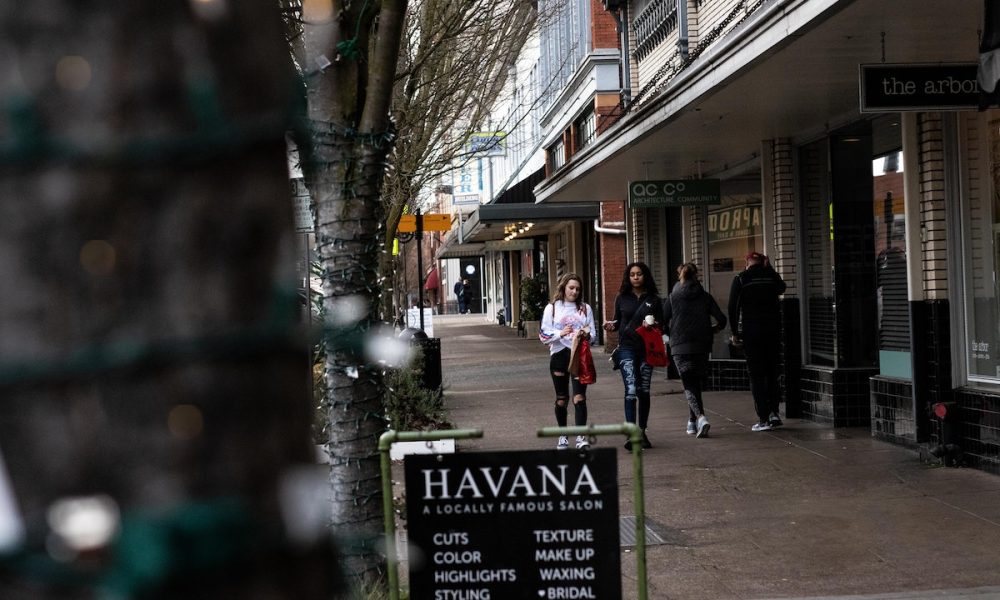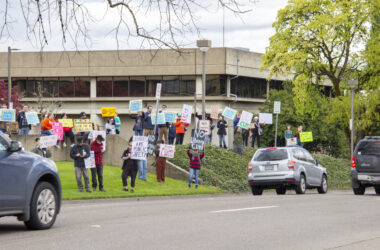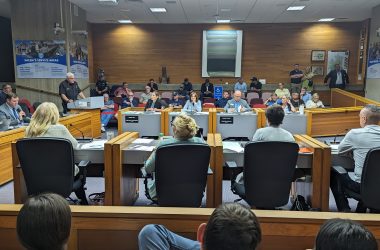
Shoppers walk along State Street in downtown Salem. (Caleb Wolf/Special to Salem Reporter)
Update 6:40 p.m.: The original article has been updated to include more information.
The city of Salem is making another run at keeping sidewalks clear from behaviors that have repeatedly disrupted downtown businesses, reviving a legal approach it tried two years ago.
Salem’s proposal would ban sleeping or lying on sidewalks and other public rights-of-way from 7 a.m. to 9 p.m. It would ban tents and other “structures” from sidewalks at all hours. It would also ban leaving personal property unattended for more than 24 hours.
The ordinance as proposed would encompass the entire city, city officials told Salem Reporter.
The Salem City Council will consider the ordinance at its meeting Monday, July 22. A draft of the ordinance has not yet been released. City staff emailed an outline of the ordinance to several businesses Thursday afternoon.
Keep local news going – subscribe to Salem Reporter.
If someone violates the ordinance, police first warn the person, Urban Development Director Kristin Retherford said. The second time leads to an expulsion from the area, and a third time leads to a citation.
“It does not start with an arrest,” Retherford said. “There are basically a few different levels where it can escalate and where it would be criminal.”
Day centers at The ARCHES Project and Union Gospel Mission, both of which provide homeless services in the downtown area, would remain available to someone if they are expelled from an area, Retherford noted.
The ordinance aims to keep business areas, such as downtown, clean and safe, while also directing violators of the ordinance to services they may need, Retherford said.
“We don’t want to make it harder for people to get those services because the ultimate goal is to get them treatment, get them housed,” she said. “We want to continue having a path for people to access services.”
There are exceptions to the ordinance. The outline emailed to business owners includes exceptions like medical emergencies, people with disabilities, strollers, sidewalk cafes, waiting for the bus and other activities.
Salem Police Department Chief Jerry Moore told Salem Reporter that the ordinance gives police a way to address growing problems.
“Our purpose is not to fill a jail,” he said. “Our purpose would be to educate them and try to get them involved with agencies that can help them if they are in need of services.”
“I think we all have empathy for people that are homeless, but, as I’ve said many times, I also have empathy for businesses and people trying to make a living,” he added.
The city council considered a similar ordinance in September 2017, but rejected it after residents said the proposal was unconstitutional, according to archived news reports.
“I think it’s something we need to consider again,” said Mayor Chuck Bennett. “One of the most common complaints I get are people camping and blocking the sidewalk and the discomfort that causes the business owners (downtown), as well as the customers.”
Concerns haven’t waned that such an ordinance — often referred to as “sit-lie laws” — could do more harm than good, said Jimmy Jones, executive director of the Mid-Willamette Valley Community Action Agency.
“I can say that the homeless provider community has historically viewed sit-lie ordinances negatively. The reason for that is that they criminalize people’s right to exist,” he said.
However, the latest proposal could limit that harm, Jones said. He said his organization was among those consulted in developing the ordinance. He noted he hasn’t seen the final draft of the ordinance and said he’s staying cautious.
“If the city can craft an ordinance that helps end homelessness and doesn’t compromise human dignity, we would of course support that,” he said.
Tom Hoffert, CEO of the Salem Area Chamber of Commerce, said the business organization had not yet come a position on the ordinance as of Thursday night. But he said the chamber “has always supported the needs of property owners,” and efforts to help that “would be traditionally supported by the organization.”
The proposed law is the latest attempt by Salem staff and elected officials to address the complex nature of homelessness.
In September 2017, the city council gave $1.4 million to create and a run a Homeless Rental Assistance Program, aimed at putting a roof over people considered “the hardest to house.” The program’s funding was recently reduced because it wasn’t spending as much as it was given.
Around that same time is when city council turned away the first sit-lie ordinance. However, the council did launch the Downtown Homeless Solutions Task Force.
After several meetings in 2018, the task force made eight recommendations that included providing around-the-clock access to toilets and greater access to storage, showers and laundry services.
READ: Recommendations from the Downtown Homeless Solutions Task Force.
In March, city council gave $1.1 million to The ARCHES Project in part to expand its day center and offer some of those services. Construction is expected to wrap-up this fall, Jones said.
Likewise, last month, city officials gave $750,000 to Union Gospel Mission’s effort to to build a much-expanded facility.
“We’ve delivered or will be shortly delivering on a lot of things that were identified through the task force,” Retherford said. “Some of them will take a little longer, but we’ve made a quit a bit of progress.”
The proposed ordinance may still have to negotiate legal concerns. In September 2018, an ordinance proposed by the city of Boise that would have banned sleeping outdoors at all hours was ruled unconstitutional by the 9th U.S. Circuit Court of Appeals.
Salem’s proposed ordinance does not go that far, said City Attorney Dan Atchison.
“The restrictions on sitting or lying in the sidewalk in Salem’s proposed ordinance apply only during daytime hours, and contain a number of exceptions,” Atchison said. “The 9th Circuit specifically stated that reasonable regulations of public places is permissible, even as applied to a homeless individual, so long as adequate alternatives remain available.”
Have a tip? Contact reporter Troy Brynelson at 503-575-9930, [email protected] or @TroyWB.
 Homeless residents had camped under the Marion Street bridge until a sweep in January. Salem’s new law would ban such sleeping on sidewalks and public rights of way during daytime hours. Tents would be banned from sidewalks at all hours. (Troy Brynelson/Salem Reporter)
Homeless residents had camped under the Marion Street bridge until a sweep in January. Salem’s new law would ban such sleeping on sidewalks and public rights of way during daytime hours. Tents would be banned from sidewalks at all hours. (Troy Brynelson/Salem Reporter)









